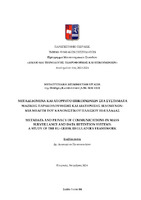Μεταδεδομένα και απόρρητο επικοινωνιών στα συστήματα μαζικής παρακολούθησης και διατήρησης δεδομένων : μια μελέτη του κανονιστικού πλαισίου ΕΕ-Ελλάδας
Metadata and privacy of communications in mass surveillance and data retention systems : a study of the EU-Greek regulatory framework

View/
Abstract
This thesis examines the legal protection of communications privacy, with a focus on communication metadata as an essential part of protectable communications privacy. The analysis highlights the importance of metadata. Although the research does not include the content of communications, it provides equally revealing information about the relationships and activities of individuals. In this context, critical questions are raised in regard to the adequacy of the institutional guarantees provided by both Greek law and European case law.
The paper thoroughly examines the current legal framework at international and European level, with an emphasis on the case law of the ECtHR and the CJEU. In particular the thesis discusses the decisions concerning mass surveillance and general data retention. These judgments highlight the limits of state intervention, while setting strict conditions to ensure proportionality, legality and the existence of adequate safeguards.
The research then turns to the Greek legal framework, focusing on Law 5002/2022, which introduced significant changes to the procedure of lifting the confidentiality of communications. Through the analysis of case law, institutional provisions, and the recent case of the "wiretapping scandal", the rights of affected citizens and the constitutionality of the regulations are examined. The comparison of Greek practices with the standards set by European courts reveals inadequacies in institutional guarantees when it comes to the prevention of arbitrary interception as well as the accountability of state authorities.
The thesis concludes that the existing institutional safeguards, at European and national level, are not sufficient to fully protect the confidentiality of communications. Despite legislative progress and the existence of legal provisions, there are still gaps when it comes to the protection of the right to privacy. A critical assessment of the legal and institutional frameworks highlights the need to further strengthen safeguards to address contemporary challenges and effectively ensure the privacy of individuals.


